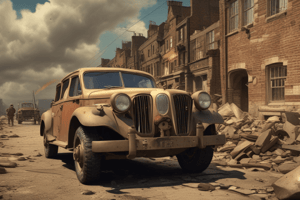Podcast
Questions and Answers
What was the purpose of the Blitz during World War II?
What was the purpose of the Blitz during World War II?
breaking the morale of the British population and disrupting war production
What marked the home front efforts during the Blitz?
What marked the home front efforts during the Blitz?
a spirit of unity, cooperation, and sacrifice
What was the role of Civil Defense during the Blitz?
What was the role of Civil Defense during the Blitz?
establishing training programs for air raid wardens, fire stations, and ambulance services
What did the Air Raid Precautions (ARP) service provide to households?
What did the Air Raid Precautions (ARP) service provide to households?
What kind of volunteer work did ordinary citizens participate in during the Blitz?
What kind of volunteer work did ordinary citizens participate in during the Blitz?
What role did women play in the home front efforts during the Blitz?
What role did women play in the home front efforts during the Blitz?
What measures were introduced to ensure fair distribution of essential supplies during the war?
What measures were introduced to ensure fair distribution of essential supplies during the war?
What type of air raid shelters were commonly built by the government across the UK?
What type of air raid shelters were commonly built by the government across the UK?
How many people were the public air raid shelters designed to protect during an air raid?
How many people were the public air raid shelters designed to protect during an air raid?
What were some examples of private air raid shelters that Britons constructed on their own property?
What were some examples of private air raid shelters that Britons constructed on their own property?
Which types of public buildings were often transformed into air raid shelters during the Blitz?
Which types of public buildings were often transformed into air raid shelters during the Blitz?
What do the home front efforts and proliferation of air raid shelters during the Blitz illustrate about the British people?
What do the home front efforts and proliferation of air raid shelters during the Blitz illustrate about the British people?
Flashcards are hidden until you start studying
Study Notes
Blitz in the UK: Home Front and Air Raid Shelters
During World War II, Britain faced an unprecedented aerial assault known as the Blitz, a German Luftwaffe campaign from September 1940 to May 1941. This period saw the intensive bombing of civilian targets in major cities, aimed at breaking the morale of the British population and disrupting war production. In response to these attacks, the British people rallied together, showcasing resilience, resourcefulness, and a deep commitment to the war effort.
Home Front Efforts
The home front during the Blitz was marked by a spirit of unity, cooperation, and sacrifice. Britons understood that their daily lives were deeply intertwined with the war effort, and they responded by supporting the armed forces and helping each other survive the bombardment.
- Civil Defense: By 1940, the government had established a comprehensive Civil Defense organization, which ran training programs for air raid wardens, fire stations, and ambulance services. The Air Raid Precautions (ARP) service, for example, issued blackout curtains to every household to prevent nighttime bombing raids from being spotted.
- Volunteer Work: Ordinary citizens volunteered their time and resources to help their communities. Neighborhoods formed air raid wardens, first aid teams, and firefighting crews. Women, in particular, played a pivotal role, working in factories, nursing homes, and serving as messengers, drivers, and assistants.
- Food and Supplies: Rationing was introduced to ensure that essential supplies were distributed fairly across the population. People endured long queues to obtain basic necessities like sugar, butter, and meat. The government also organized food drives, and a network of small allotment gardens sprang up across the country, providing fresh produce to households.
Air Raid Shelters
In the face of the Blitz, air raid shelters became an essential part of life in Britain. The government prioritized the construction of these shelters to protect civilians from the bombing raids.
- Public Shelters: The government built thousands of public air raid shelters across the country, including Anderson shelters (pre-fabricated concrete structures) and Morrison shelters (steel-framed, concrete-filled structures). These shelters were designed to protect up to six people during an air raid.
- Private Shelters: Many Britons constructed their own air raid shelters on their own property. These shelters ranged from simple, homemade dugouts to more elaborate structures, such as concrete bunkers.
- Community Shelters: Many churches, schools, and other public buildings were transformed into air raid shelters. These shelters provided a sense of community and camaraderie, as neighbors came together to protect each other from the Blitz.
Conclusion
The Blitz in the UK was a period of extraordinary hardship and sacrifice, but also one of remarkable resilience and unity. The home front efforts and the proliferation of air raid shelters illustrate the British people's determination to survive and persevere in the face of adversity. The United Kingdom's heroic response to the Blitz was a testament to the strength of its people and their unwavering commitment to defending their homeland and its values.
Studying That Suits You
Use AI to generate personalized quizzes and flashcards to suit your learning preferences.




